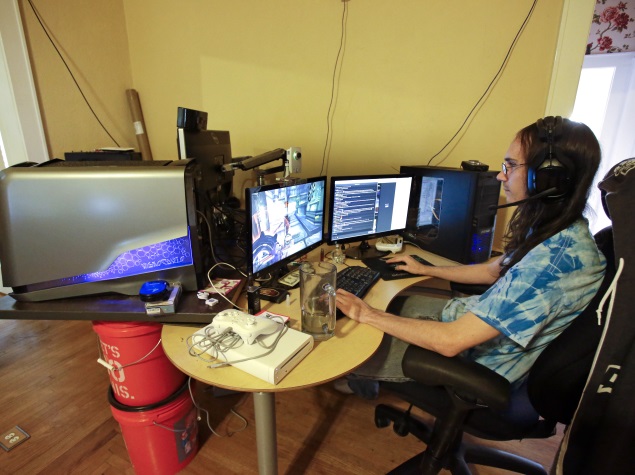- Home
- Science
- Science News
- US Intelligence Agency Aims to Develop Superconducting Computer
US Intelligence Agency Aims to Develop Superconducting Computer

International Business Machines Corp , Raytheon BBN Technologies and Northrop Grumman Corp won the contracts, the Intelligence Advanced Research Projects Activity said Wednesday, without disclosing financial details.
The Cryogenic Computer Complexity (C3) program could lead to a new generation of superconducting supercomputers, said the unit of the Office of the Director of National Intelligence.
"The energy demands of today's high-performance computers have become a critical challenge for the Intelligence Community that the C3 program aims to address," IARPA said in a statement. Such computers use massive amounts of energy.
According to ComputerWorld magazine, competition from Europe, Japan and China, which has the world's fastest computer, is spurring U.S. efforts to develop the next generation of superconducting supercomputers, called exascale.
In November, the Department of Energy awarded Advanced Micro Devices more than $32 million (roughly Rs. 198 crores) to fund exascale research. AMD Chief Technology Officer Mark Papermaster, said in a blogpost that energy has been the biggest obstacle for exascale computing, or producing a billion billion calculations per second.
"Computers based on superconducting logic integrated with new kinds of cryogenic memory will allow expansion of current computing facilities while staying within space and energy budgets, and may enable supercomputer development beyond the exascale," Marc Manheimer, C3 program manager at IARPA, said in the statement.
© Thomson Reuters 2014
Get your daily dose of tech news, reviews, and insights, in under 80 characters on Gadgets 360 Turbo. Connect with fellow tech lovers on our Forum. Follow us on X, Facebook, WhatsApp, Threads and Google News for instant updates. Catch all the action on our YouTube channel.
- Samsung Galaxy Unpacked 2026
- iPhone 17 Pro Max
- ChatGPT
- iOS 26
- Laptop Under 50000
- Smartwatch Under 10000
- Apple Vision Pro
- Oneplus 12
- OnePlus Nord CE 3 Lite 5G
- iPhone 13
- Xiaomi 14 Pro
- Oppo Find N3
- Tecno Spark Go (2023)
- Realme V30
- Best Phones Under 25000
- Samsung Galaxy S24 Series
- Cryptocurrency
- iQoo 12
- Samsung Galaxy S24 Ultra
- Giottus
- Samsung Galaxy Z Flip 5
- Apple 'Scary Fast'
- Housefull 5
- GoPro Hero 12 Black Review
- Invincible Season 2
- JioGlass
- HD Ready TV
- Latest Mobile Phones
- Compare Phones
- Tecno Pova Curve 2 5G
- Lava Yuva Star 3
- Honor X6d
- OPPO K14x 5G
- Samsung Galaxy F70e 5G
- iQOO 15 Ultra
- OPPO A6v 5G
- OPPO A6i+ 5G
- Asus Vivobook 16 (M1605NAQ)
- Asus Vivobook 15 (2026)
- Brave Ark 2-in-1
- Black Shark Gaming Tablet
- boAt Chrome Iris
- HMD Watch P1
- Haier H5E Series
- Acerpure Nitro Z Series 100-inch QLED TV
- Asus ROG Ally
- Nintendo Switch Lite
- Haier 1.6 Ton 5 Star Inverter Split AC (HSU19G-MZAID5BN-INV)
- Haier 1.6 Ton 5 Star Inverter Split AC (HSU19G-MZAIM5BN-INV)


![[Partner Content] OPPO Reno15 Series: AI Portrait Camera, Popout and First Compact Reno](https://www.gadgets360.com/static/mobile/images/spacer.png)









